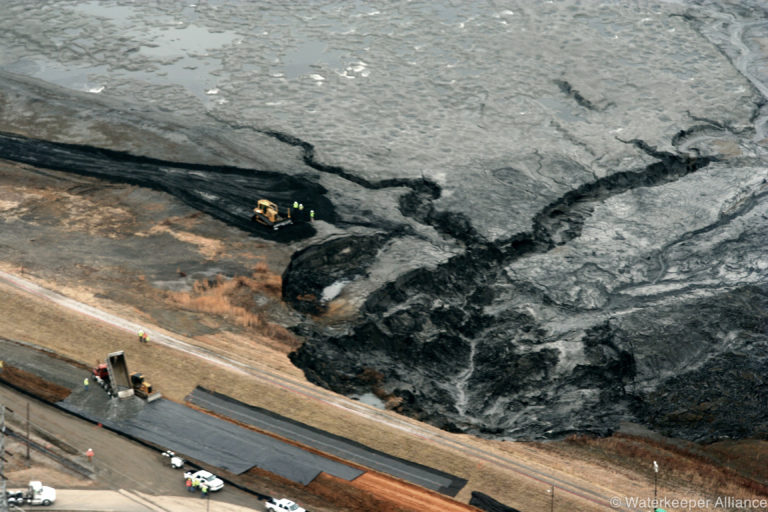
Written by Marc Yaggi and Gabrielle Segal
President Donald Trump and EPA administrator Andrew Wheeler (and his predecessor Scott Pruitt) have been aggressively rolling back coal regulations — actions that will pollute our water and endanger our communities. Coal is a product that is dirty from beginning to end — whether it is directly polluting our waters or emitting greenhouse gases and driving climate change. Below is an outline of the Trump administration’s coal-related rollbacks:
Mining/Extraction
Coal mining and extraction threaten waterways with pollution from harmful contaminants like heavy metals and fluorides, often found in the wastewater from mining processes. Through a bill signed by Trump, Congress rescinded the Obama-era Stream Protection Rule, which prevented coal companies from dumping mining debris into streams. They did this despite the rule’s reported health and environmental benefits, including reducing human exposure to contaminants in drinking water and reforestation to increase carbon storage, reduce emissions, and mitigate climate-change related risks.
Transportation
A majority of coal is transported by train throughout the United States. In the process of transporting it, vast amounts of toxic coal dust fly off of the trains and pollute waterways. The transportation of coal to California, Oregon, and Washington has been a contentious issue for years. Coal companies have tried to open export terminals in these states to export coal from the West Coast, but the states have not agreed to it largely because of public opposition to the projects. Locals have objected to transportation for fear of the impact of coal dust blowing off of the trains and into their homes, among other concerns.
Now the Department of the Interior is suggesting the use of naval bases to transport fossil fuels through states that have stopped previous export terminals. Interior Secretary Ryan Zinke claims this underhanded way to push through coal exports is in the best interest of our national security. But Zinke and the Trump administration should consider this report from the Pentagon showing that climate change is a major threat to our national security.
Combustion
When coal is burned, it releases into the atmosphere a myriad of toxic pollutants that are harmful to human health and is a major source of greenhouse gas emissions. Research shows that human-induced climate change caused Hurricane Florence to be 50 miles wider and drop 50 percent more rain. Hurricane Michael hit the Florida panhandle with winds of 155 mph, and is the strongest storm to hit the mainland U.S. in 50 years. In response to a startling report from the UN’s scientific panel on climate change, Drew Shindell, climate scientist at Duke University, stated: “The report makes it clear: There is no way to mitigate climate change without getting rid of coal.” However, the Trump administration has shown no signs acknowledging the devastating challenge of climate change or coal’s role in it.
The administration plans to replace the Obama-era Clean Power Plan, a policy meant to curb human-induced climate change, with a much more conservative plan, called the Affordable Clean Energy (ACE) rule. The ACE rule, however, does more to assist coal companies than provide “clean” or safe energy, or mitigate climate change by regulating greenhouse gas emissions.
Disposal
Coal ash, the toxic byproduct of coal-burning power plants which contains mercury, arsenic, and a witches brew of hazardous substances, typically is stored in open ponds. Unlined or improperly lined coal ash ponds have leaked toxins into our water, causing cancer, developmental defects, and more severe health problems. Coal ash is the number one source of toxic water pollution in the United States.
Despite this, EPA postponed the first-ever federal standards for coal ash disposal, established under the Obama administration. In July 2018 under former coal lobbyist Andrew Wheeler, EPA finalized a rollback to a rule which set standards for how companies store or dispose of coal ash. The rule aimed to close storage sites in unsafe locations or leaking contaminants into groundwater. Waterkeeper Alliance and five more environmental groups filed a lawsuit against EPA, citing concerns over coal ash spills after recent hurricanes.
In 2017, the Trump administration put on hold until 2020 a regulation that required coal-fired power plants to limit the dumping of toxic pollution into waterways in order to reconsider many of the requirements in response to industry complaints. Waterkeeper Alliance is challenging these rollbacks in court.
While the Trump Administration is working to weaken this rule, Waterkeeper Alliance recently won a court case declaring the Obama-era rule to be too weak to protect public health. The Courts ordered EPA to revise the landmark rule regulating coal ash dumps because it failed to adequately protect against pollution from unlined and inadequately lined ash pits. The court sided with public interest groups who were concerned with the health and environmental threats from these dump sites; flooding of coal ash ponds in North Carolina after the hurricane is a clear example of these dangers. Thus, the Trump administration is trying to weaken a rule the courts and public already deemed too weak.
What You Can Do
Opposing the ACE rule is a huge first step in the coal industry’s trail of disaster. Here is a template to make it easy for you to submit a comment by October 31 to oppose the ACE rule.